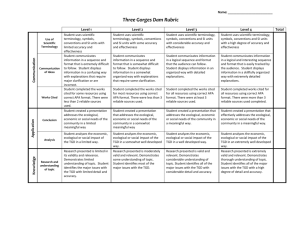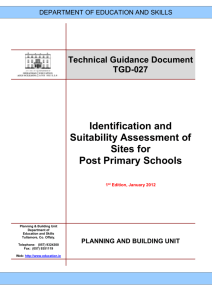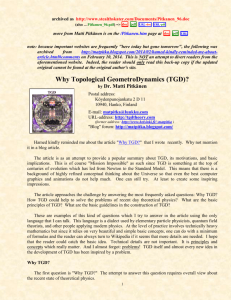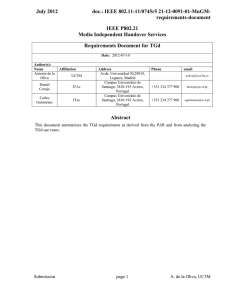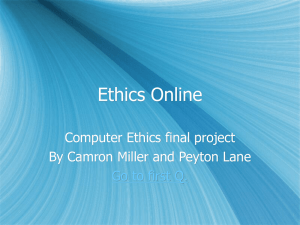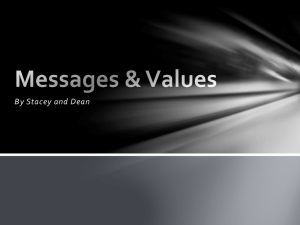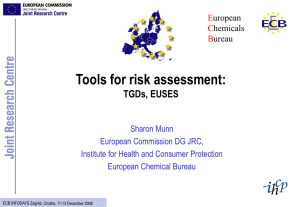Part B
advertisement
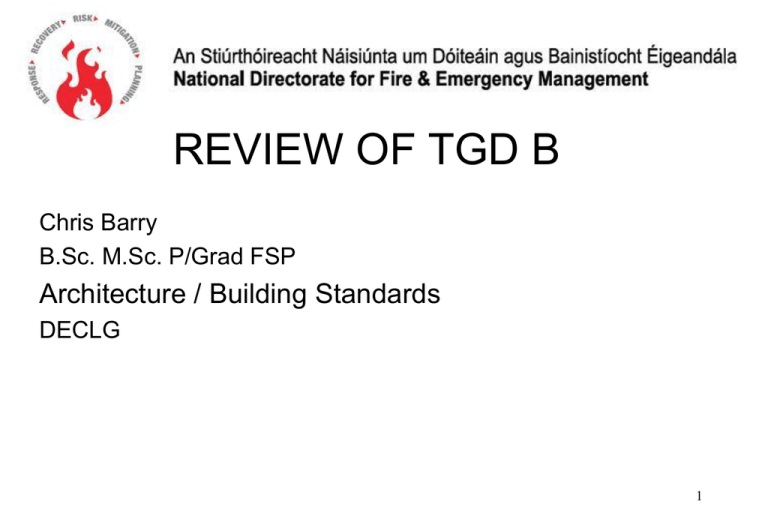
REVIEW OF TGD B Chris Barry B.Sc. M.Sc. P/Grad FSP Architecture / Building Standards DECLG 1 REVIEW OF TGD B • • • • • • • • Part B First Principal and Focus of the Review Life Safety Occupants/Residents/Visitors /Fire fighters Fire Engineering Developments International Developments Construction Products Directive (CPD), Euro codes: Part B – A Guidance document not a Code of Practice 2 REVIEW OF TGD B Updates and Approach • Existing Document Structure: B1-B5 • Proposed Format: Single Volume /Two Volume (A.D.B: Domestic–Non Domestic) • Developments/Changes in Building Regulations InternationallyPerformance based approach v prescriptive • Approaches: General (Part B) Advanced (B.S.9999) , Fire Engineering (B.S.7974) • Update references: BS 5588(5-12)-BS 9999, • BS 5588-1 Residential –B.S. 9991 • Suggested areas for revision B1 55% B5 25% B2,3,4 20% 3 REVIEW OF TGD B • • • • • General Issues Integrated Management of Buildings: include fire safety template in appendix. Historic Buildings Building Types- Purpose Groups- Definitions- Expand? Restaurant/bar – retail? – bookies, crèches? Other building types: Schools (B.B.100), Hospitals, (H.T.M. Docs.) Care Homes, Places of Assembly, Stadia, Atria,Shopping Centers Sheltered Housing/Houses in Multiple Occupation: 4 REVIEW OF TGD B • National Codes of Practice • Existing National Codes of practice: Revise or not?- Status in new regulations • Code of Practice for Fire Safety of Furnishings and Fittings in Places of Assembly(1989) Code of practice for Safety at Indoor Concerts (1998) Fire Safety in Nursing Homes – A guide to Fire Safety in Existing Nursing Homes and Similar Type premises – (1996) Code of practice for Safety at Indoor Concerts (1998) Fire safety in Guest Accommodation : A Guide to Fire Safety in Existing Guesthouses, B&B ‘s & Similar Establishments, Providing Overnight Guest Accommodation Fire precautions in existing Hotels, Guesthouses, and similar premises - 1989 Fire Safety in Flats – A guide to Fire Safety in Flats, Bedsitters and Aprts - 1994 Fire safety in Pre-Schools: A Guide to fire Safety in Premises used for Pre-School Services 5 Fire Safety in Hostels – A guide to Fire safety in Existing Hostels (1998) Code of Practice for the Management of Fire Safety in Places of Assembly – 1989 • • • • • • • • • REVIEW OF TGD B Consultancy Report Consultancy Service to carry out a study and to make draft proposals on the impact on life safety in Dwelling Houses Flats and Maisonettes (Purpose Groups 1(a),1(b),1(c)) of the installation of enhanced levels of fire alarm and detection systems 6 REVIEW OF TGD B • • • • • • • • • • B1 Means of Escape Impact of Part M - Access and Use Disability Access Certificate-Process Use of Lifts for Evacuation: NDA Recommendations: Safe Evacuation for All (March’11) 5.4.1, 5.4.2. Risk assessment /PEEPS Responsibility for evacuation of disabled persons-Management The provision of enhanced fire alarm detection/Emergency Lighting for disabled persons/ L.E.D. lighting to floors Width of escape routes Refuges-communication Rest areas on escape stairs (WTC NIST Report) Effect on escape times 7 REVIEW OF TGD B • B1 Means of Escape • Place of Safety: Timber decks to rear of domestic dwellings, Balconies • Security V Escape • Thumb locks to final exit doors in Domestic Dwellings • Fitting electronic automatic release devices on fire doors, effect on integrity of fire resistance • Escape windows: area-height-Part K- Replacement Windows • Stairs : Part K, Part M • Nursing Homes- Staff ratio/Progressive Horiz. Evacuation • “Hold open” devices-Swing Free • Compartment Size: occupancy levels • Storage rooms on escape routes/ Protected Escape Stairs 8 REVIEW OF TGD B • B2: Internal Fire Spread (linings) • The impact of Part L on fire development/behaviour in Buildings “Innovative Construction Products and Techniques” BD 2503 DCLG(UK) 2008 • Materials used in construction • Fuel Load • Rate/Intensity of fire development • Air-tightness • Air-to-Air heat exchangers • Ductwork for heat recovery systems • Pumps for solar panels • Inverters for PV systems 9 REVIEW OF TGD B • • • • • • • • • B3 Internal Fire Spread (Structure) Timber framed Dwellings IS 440(2009) 2/3 story dwellings- Multi story apartments Collapse of engineered timbers- structural floors Fire stopping Fire spread in cavities Cavity barriers (closed joints) Management: Alterations Fire Fighting Operations Underground car parks 10 REVIEW OF TDG B •B5 Access and Facilities for the Fire Service •The provision water supply for fire fighting, statutory responsibilities/onsite provision of static water storage •Access to all points of a Dwelling (not just front door) : Access to gated Developments •Forms of construction (timber frame etc) effect on fire fighting methodsoffensive fire fighting • Fire Fighting Lifts -18M + • Max size of compartment in single story building too large- high risk (Table 3.1 p77) •Escape across a flat roof: plant & equipment present: Not allowed in public buildings •20m Reversing Limit –adjust ? 11 REVIEW OF TGD B • Storage of flammable gas/liquid cylinders/containers in commercial buildings • Certification of products and verification of installation /assembly processes. Ensures fire resistance is maintained through installation process • B.E.S.S. Building Emergency Safety Systems-RECI • No self closing devices on doors in dwellings/flats? (ADB UK) • Cavity Barriers: upvc Windows/Door frames Low melting point: Fire spread into cavity/compartment • Community Fire Safety: Life span of smoke/heat detectors • Carbon monoxide detectors -Part J: Review commenced Required in all Bedrooms (Canada) 12 REVIEW OF TGD B Thank You chris.barry@environ.ie 13
